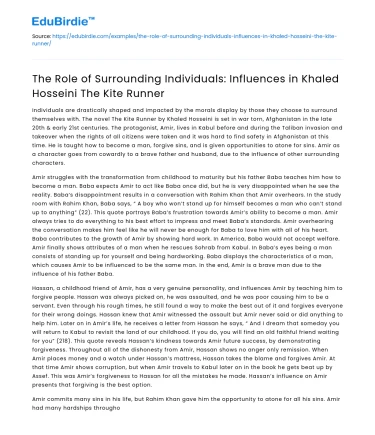Individuals are drastically shaped and impacted by the morals display by those they choose to surround themselves with. The novel The Kite Runner by Khaled Hosseini is set in war torn, Afghanistan in the late 20th & early 21st centuries. The protagonist, Amir, lives in Kabul before and during the Taliban invasion and takeover when the rights of all citizens were taken and it was hard to find safety in Afghanistan at this time. He is taught how to become a man, forgive sins, and is given opportunities to atone for sins. Amir as a character goes from cowardly to a brave father and husband, due to the influence of other surrounding characters.
Amir struggles with the transformation from childhood to maturity but his father Baba teaches him how to become a man. Baba expects Amir to act like Baba once did, but he is very disappointed when he see the reality. Baba’s disappointment results in a conversation with Rahim Khan that Amir overhears. In the study room with Rahim Khan, Baba says, “ A boy who won’t stand up for himself becomes a man who can’t stand up to anything” (22). This quote portrays Baba’s frustration towards Amir’s ability to become a man. Amir always tries to do everything to his best effort to impress and meet Baba’s standards. Amir overhearing the conversation makes him feel like he will never be enough for Baba to love him with all of his heart. Baba contributes to the growth of Amir by showing hard work. In America, Baba would not accept welfare. Amir finally shows attributes of a man when he rescues Sohrab from Kabul. In Baba’s eyes being a man consists of standing up for yourself and being hardworking. Baba displays the characteristics of a man, which causes Amir to be influenced to be the same man. In the end, Amir is a brave man due to the influence of his father Baba.
Save your time!
We can take care of your essay
- Proper editing and formatting
- Free revision, title page, and bibliography
- Flexible prices and money-back guarantee
Hassan, a childhood friend of Amir, has a very genuine personality, and influences Amir by teaching him to forgive people. Hassan was always picked on, he was assaulted, and he was poor causing him to be a servant. Even through his rough times, he still found a way to make the best out of it and forgives everyone for their wrong doings. Hassan knew that Amir witnessed the assault but Amir never said or did anything to help him. Later on in Amir’s life, he receives a letter from Hassan he says, “ And I dream that someday you will return to Kabul to revisit the land of our childhood. If you do, you will find an old faithful friend waiting for you” (218). This quote reveals Hassan’s kindness towards Amir future success, by demonstrating forgiveness. Throughout all of the dishonesty from Amir, Hassan shows no anger only remission. When Amir places money and a watch under Hassan’s mattress, Hassan takes the blame and forgives Amir. At that time Amir shows corruption, but when Amir travels to Kabul later on in the book he gets beat up by Assef. This was Amir’s forgiveness to Hassan for all the mistakes he made. Hassan’s influence on Amir presents that forgiving is the best option.
Amir commits many sins in his life, but Rahim Khan gave him the opportunity to atone for all his sins. Amir had many hardships throughout his life, Rahim Khan was always there for him and shows love. When Amir left Afghanistan in March of 1981, Rahim Khan lives in Baba’s house. He could no longer take care of the house himself, he sets out to find Hassan and family to help. When Amir goes to Peshawar Rahim Khan tells him about this experience and gives him the moment to redeem himself. He asks Amir to go back to Kabul to find Sohrab. When Amir declines, Rahim Khan replies, “Children are fragile, Amir jan. Kabul is already full of broken children and I don’t want Sohrab to become another” (220). This quote proves that Rahim Khan has love for both Sohrab and Amir. He wants them both to have the best life possible. In Rahim Khan’s eyes, Amir going back to Kabul would be a chance for him to get the son he always wanted and an opportunity to atone for his sins. Although Amir was atoning for his sins he was also atoning for Baba's sins. The influence that Rhaim Khan had on Amir taught him to do right to start with.
In conclusion, as Amir transfers from adolescence to adulthood, he transforms from a wimp to a fearless man. Each character that Amir chooses to surround himself with influence him in a different way. His father Baba develops him into a man, his best friend shows him forgiveness, and Rhaim Khan gives him the opportunity to atone for sins. The population is influences other based on what other practice as good.






 Stuck on your essay?
Stuck on your essay?

